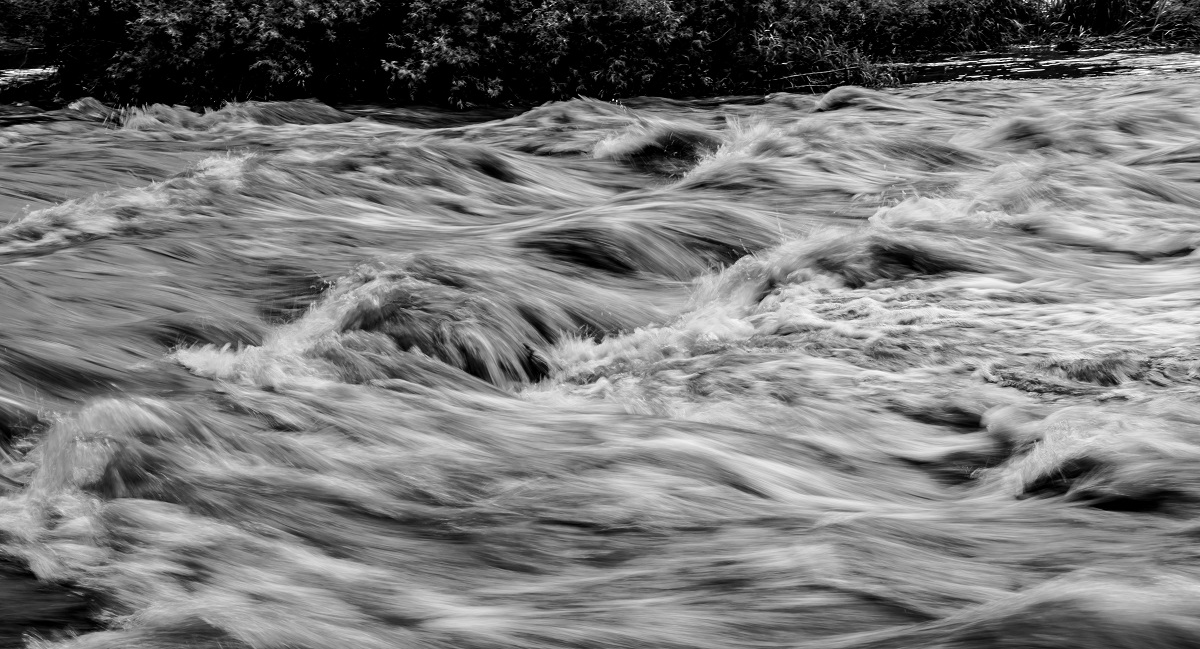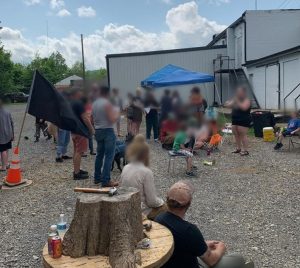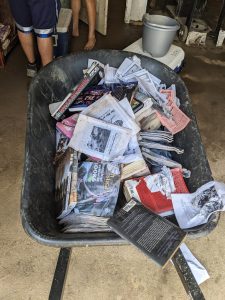from It’s Going Down

A personal reflection of the recent floods in Appalachia and their impact on autonomous and mutual aid organizing.
I hate floods. The unstoppable rush of water, waste, runoff, debris, trash, and lives, overtaking everything. Taking the path of least resistance, overwhelming everything it desires, building enough energy behind it to overwhelm lives. I also love floods. The natural rhythm of waterways, bending, forking, rushing, bringing with it nutrients and regeneration; a force so powerful that it can carve away mountains. I’ve lived in a couple of flood plains, but when I think about it, my first interaction with flood waters was cleaning up houses that had been submerged and destroyed by Hurricane Katrina. After that I waded knee deep in toxic flood waters in Coastal and Eastern North Carolina responding to Hurricane Florence, bringing supplies to communities that had not yet recovered from the previous hurricane years prior.
Mutual Aid Disaster Relief taught me flood waters are not obstacles. I mean, not really obstacles if we are determined and working collectively. Nor are they obstacles to imagining and building new worlds, by bringing collective power to meet people where they are. I’ve committed myself to mutual aid and, in turn, disaster relief. Just one of many concerted relief efforts, not just in solidarity with communities devastated by floods, but with everyone experiencing the ongoing and growing catastrophes of decaying empires, late-stage capitalism, and ecological genocide.

May Day Celebration SOURCE: Mutual Aid Space Knoxville, Instagram
Eastern Tennessee and Southern Appalachia are no strangers to floods. This month communities across Eastern Tennessee and Southwest Virginia were hit with heavy flooding. When I lived in Wise County, Virginia, I felt like you could always tell someone’s wealth by how close they lived to the bottom of the holler and creek. This past weekend, the flooding came home.
In the scale of things, the flood that struck our mutual aid space was small and fast. It came in the middle of the night; crept through our door jams and dreams, and destroyed pretty much everything. Supplies for harm reduction. Food for distribution. Clothes and other things for next week’s Free Store. Equipment like our lil’ old printer, that supported and reinforced the work of not only the Knoxville Radical Library, but also the First Aid Collective Knoxville (FACK). The sound system that supported bands during fundraisers and gave voice to speakers at events. Our children’s corner ended up in the food shelf; muddy Narcan commingling with canned peas and Bookchin.
Mutual Aid Space Knoxville (MASK) wasn’t much to look at from the outside. A gravel parking lot and a cozy, if not a bit moldy, space in the basement of a small strip mall. A garage door. Nothing to really hint at the work that went into making it. My participation may have started by sitting at a table at a local syringe exchange, medic’ing protests and events. Meeting folks where they are is always good work, but it felt like small tomatoes when COVID came. COVID changed the world. Flooding our lives with uncertainty, precarity, illness, and death. Collectively we are still struggling to figure out exactly what that change now means. COVID also changed
FACK, and over the past 2.5 years, we’ve been trying to figure what that means as well.

Community members moved in to meet a global catastrophe.. Our government and systems were never designed to take care of us. An underfunded and already stressed infrastructure crumbled in the initial wave of COVID. Our healthcare was politicized and the government (at all levels) chose to sacrifice us to their golden calf, the economy. People had needs, and quicker than anyone, the anarchists and communists, queers and weirdos who work to build better worlds, organized national and local relief efforts so effective that a large portion of the establishment began to co-opt the term mutual aid, to capitalize on the grass roots efforts growing in the flood plain of discontent. Knoxville City has on more than one occasion directed individuals they were unable to support to us. At the same time undermining and attempting to criminalize our efforts.
Regardless, mutual aid efforts bubbled up around the world to meet COVID and capitalism head on. FACK began working out of The Birdhouse Knoxville, which donated the space to us. We started food distribution, harm reduction, and even integrated herbal plant medicines to support those of us who had to face a global pandemic and the 2020 uprisings, without any health insurance or safety net.
In our organizing we centered those most in need. We did what we could to tear down barriers while standardizing the way we manage support for a community of people. Our COVID-19 protocols for distribution, which were built by other mutual aid collectives, were more stringent than anything being put forward by the politicians across Tennessee. East Tennessee Harm Reduction spun out of our work with Knoxville’s homeless population. Challenging police, the city, and NIMBY’s while humanizing drug use and providing care. Raising resources to combat the wave of attacks against our poor and houseless populations.
We quickly outgrew the Birdhouse’s 4th and Gill niceties, and through deep personal relationships, found our latest location off Central Street. This space was supposed to be solid footing. A location that, as long as we could make rent each month, we could use to build out our radical community, offer safety and connection, and organize within its walls to tear down walls elsewhere; to build bridges; and to shape something out of the compost of settler-project. In the year or so that we’ve had the space, we have not only weathered COVID as a cohesive and continuously operating collective of people, but we grew in size. Expanding harm reduction efforts and creating a space for labor organizing, collective car maintenance, stop the bleed trainings, community events, and May Day shenanigans.
Right now, we’re mucking the space and picking up the pieces. We are trashing ruined supplies, equipment, and gear, but most importantly we are dreaming about tomorrow. The flood may have brought with it some pain and destruction, but it also fertilized our desires. The community response to this flood has been immediate. Funding drives have been set up. Work days scheduled. Dumpsters filled, and we’re mobilizing with multiple networks in order to continue our work into the future. MASK, and the collective groups that worked out of there have touched thousands of Knoxville community members’ lives over the past couple of years, and we aren’t going to stop. Mutual aid is built on trust and commitment to each other, and we will do what we can to continue to develop that. Whether it be the Gulf Coast, or Central Street, when the flood waters recede we will be there. For each other and beside each other.
Please consider supporting our work and donate to our GoFundMe. We know we can build something even better out of this disaster.
@MutualAidSpaceKnoxville
@FirstAidCollectiveKnoxville
@EastTennesseeHarmReduction
@KnoxvilleRadicalLibrary
@Service Industry Coalition Knoxville
